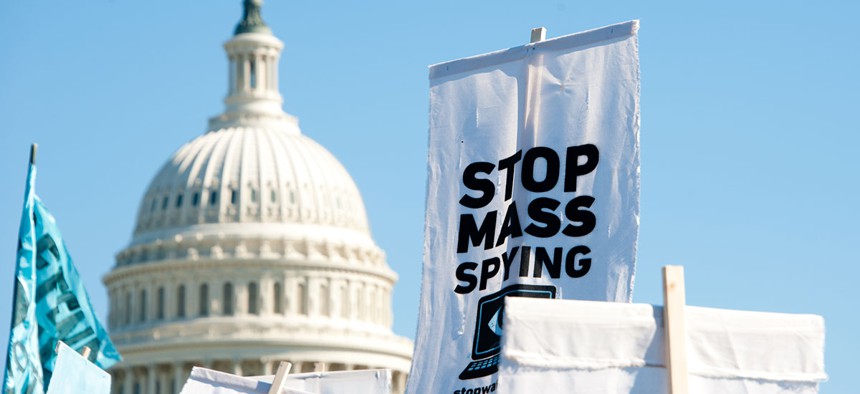
Protestors rally against mass surveillance in Washington, DC in 2013. Rena Schild / Shutterstock.com file photo
Patriot Act In Uncharted Legal Territory As Deadline Approaches
Will the Patriot Act mean something different if lawmakers renew it now that they know the full extent of the NSA's spying?
Can Congress overrule a court decision without changing a word in the law?
That's the question that lawmakers are wrestling with after a federal appeals court ruled last week that a controversial National Security Agency surveillance program is illegal. The U.S. Court of Appeals for the 2nd Circuit didn't address the claims that the program violates constitutional privacy rights. But the judges did rule that the NSA's mass collection of millions of U.S. phone records oversteps the authority that Congress gave the agency under the Patriot Act.
Although Congress has renewed the Patriot Act several times since first passing it in 2001, most lawmakers had no idea how the NSA was using the powers, the court found. "Congress cannot reasonably be said to have ratified a program of which many members of Congress—and all members of the public—were not aware," Judge Gerard E. Lynch wrote in a unanimous decision for the court.
The key provision of the Patriot Act, Section 215, is set to expire in just a few weeks. Senate Majority Leader Mitch McConnell and other top Republicans are pushing for a clean reauthorization of the surveillance law, arguing that the NSA program is critical for thwarting terrorist attacks.
Extending the law this time might give it a new meaning because, in the wake of Edward Snowden's leaks of classified documents, lawmakers would understand for the first time what they were actually voting on.
"If they reauthorize the program, the basis on which the 2nd Circuit rejected the program fails, or at least is substantially undermined and would have to be re-litigated from scratch," said Stewart Baker, a partner at the law firm Steptoe & Johnson and a former general counsel for the NSA.
Congress will either renew the program, change it, or let it expire. No matter which option it chooses, the court's decision will be irrelevant in a few weeks, Baker said.
"This was a 97-page law review article," he said. "Its significance is close to zero."
Senate Intelligence Committee Chairman Richard Burr, a North Carolina Republican who also ispushing for a clean renewal of the Patriot Act, argued that the court decision is wrong now, and Congress doesn't have to do anything to address it.
"I think the statutory language today allows the NSA to do exactly what they're doing," he said, adding that the issue will likely end up at the Supreme Court. "I have a very tough time thinking the Supreme Court would look at this law… and come to the conclusion that we didn't empower the NSA to do bulk collection."
But the NSA's critics argue that it won't be so easy for Congress to ignore the court's ruling. Words have meaning, they say, and Congress can't stretch words to mean something new.
"Words don't just mean whatever the NSA says they mean," said Alvaro Bedoya, the executive director of the Center on Privacy & Technology at Georgetown Law Center. If lawmakers want to authorize the mass collection of Americans' phone records, they would have to write new language for that, he argued.
Section 215 of the Patriot Act currently gives the NSA the authority to seize any "tangible thing" that is "relevant" to an intelligence investigation. The government argues that all U.S. phone numbers, call times, and call durations are "relevant" because the agency uses them to compile a vast database that it then sifts through for terrorism connections.
But the court said privacy advocates are right to believe that "such an expansive concept of 'relevance' is unprecedented and unwarranted."
Neema Guliani, a legislative counsel for the American Civil Liberties Union, which brought the case before the 2nd Circuit, said the court decision shows that the Patriot Act can't be used to justify mass surveillance. "The court was pretty blunt in saying the plain language of the statute is clear and that can't be superseded," she said.
She also argued that it's extremely unlikely that a majority of Congress will agree to reauthorize the Patriot Act without substantial reforms. The House is set to vote this week on the USA Freedom Act, which would extend the Patriot Act but keep the bulk databases of phone records out of the hands of the NSA.
The court's decision has given the NSA's critics in Congress a new boost of momentum, Guliani argued. "I would be surprised if, given the Second Circuit decision, members of Congress were willing to reauthorize programs that independent oversight bodies and the courts have now found were a violation of the law," she said.
But Sen. Rand Paul, who voted against the USA Freedom Act last year because he said it didn't go far enough in reining in the NSA, argued that in the wake of the court's ruling, Congress should be especially cautious about any bill to extend surveillance authorities.
"Now that the appellate court has ruled that Section 215 doesn't authorize bulk collection, would the USA Freedom Act actually be expanding the Patriot Act?" the Kentucky Republican and presidential candidate asked in an op-ed in Time. "That would be a bitter irony if the attempt to end bulk collection actually gave new authority to the Patriot Act to collect records.
—Dustin Volz contributed to this article
(Image via Rena Schild / Shutterstock.com
NEXT STORY: Play of the Day: The Tonight Show Memes 2016







